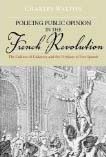From the publishers:
In the Declaration of the Rights of Man and of the Citizen of 1789 , French revolutionaries proclaimed the freedom of speech, religion, and opinion. Censorship was abolished, and much like the early American Republic, France appeared to be on a path towards freedom, tolerance, and pluralism. Four years later, however, the country slid into a period of political terror. Thousands were indicted for speech crimes, many of whom were guillotined. The revolutionary government also set out to morally regenerate society, monitoring and engineering public opinion in ways scholars have characterized as totalitarian.
Charles Walton traces the origins of this tragic reversal back to the Old Regime. He shows that early advocates of press freedom only sought to abolish pre-publication censorship. Most still believed that injurious speech — or “calumny” — was a criminal offense, even treasonous, if it undermined the honor of sovereign authority or collective moral values.
In 1789, when institutions that had regulated honor and morality collapsed, calumny exploded, envenoming politics and society. Drawing on wide-ranging sources, from National Assembly debates to local police archives, Walton shows how relentless calumny and struggles to set legal and moral limits on free speech radicalized politics, leading to the brutal repression of “calumniators” and fanatical efforts to remake society's moral foundation during the Terror of 1793-1794.
In addition to advancing [an] interpretation of the origins of the Terror, Walton offers a [new] approach to the study of the French Revolution. This moment of democratic transition – when old punitive reactions based on social hierarchy and authoritarianism mixed with new liberal but vaguely defined principles – was hampered by weak political legitimacy. The result: revolutionaries obsessed with securing honor, deference, and the moral restraint of the masses to shore up an abrupt regime change.
Policing Public Opinion in the French Revolution: The Culture of Calumny and the Problem of Free Speech
Author(s) : WALTON Charles

- Year of publication :
- 2009
- Place and publisher :
- Oxford University Press
- Number of pages :
- 352

